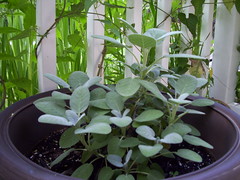Rosemary
In Victorian times, rosemary was part of the language of flowers, and it was an herb signifying remembrance. This association of rosemary with remembering is not just romantic fancy - rosemary contains rosmarinic acid, a potent antioxidant that helps clean up free radicals in the body. It has other mind-enhancing compounds, too, including compounds that preserve acetylcholine in the brain. Acetylcholine is a key neurotransmitter in the brain.
| Sage (Photo credit: BellaEatsBooks) |
There is a reason why wise people are called "sages." Sage, like rosemary, inhibits the breakdown of acetylcholine. It is rich in antioxidants as well. The inhalation of sage essential oil is also helpful for enhancing mental clarity. Sage can be added to foods, brewed into a warming tea, or taken in capsules.
Ginger
This spicy herb has been known to treat migraines as effectively as medication. This suggests that it not only helps inflammation, but inflammation specific to the head and brain. Try brewing some ginger tea (simmer 1 teaspoon of grated fresh ginger root in a cup of water for 10 minutes), or eat whole, candied ginger root. You can also add ginger to soups, broths, and stir-fries.
Curry
Curry contains, in addition to other spices, cumin and turmeric. Turmeric helps reduce inflammation, and inflammation is associated with memory disorders like Alzheimer's disease. It may also help prevent plaque build-up in the brain. Add lots of curry to your favorite dishes.
Ginkgo
Ginkgo increases the flow of blood to the cerebrum, and the more blood circulating in the brain, the better your memory and mental faculties. Ginkgo is taken in the form of supplements - take no more than 240 milligrams of standardized extract a day.
Horsebalm
| Monarda fistulosa (bee balm) (Photo credit: Wikipedia) |
Horsebalm contains carvacrol and thymol, which are inhibitors of acetylcholine breakdown. Another benefit of horsebalm is that its active compounds cross the blood-brain barrier. You can make a delicious tea from dried or fresh Monarda species.
You can also use horsebalm in tincture form - add it to lotions and shampoos to absorb the benefits through your skin and scalp. (Note: do not confuse horsebalm [Monarda Punctata] or bee balm [Monarda Fistulosa] tincture with bergamot [Citrus Bergamotia]. While Monarda species are often called bergamot, they are not the same as the citrus fruit by the same name.)
* Note: Herbs are not medications, but they can sometimes have side effects or trigger allergic reactions in some people. You should not take herbs without the supervision and guidance of a qualified health practitioner.



No comments:
Post a Comment